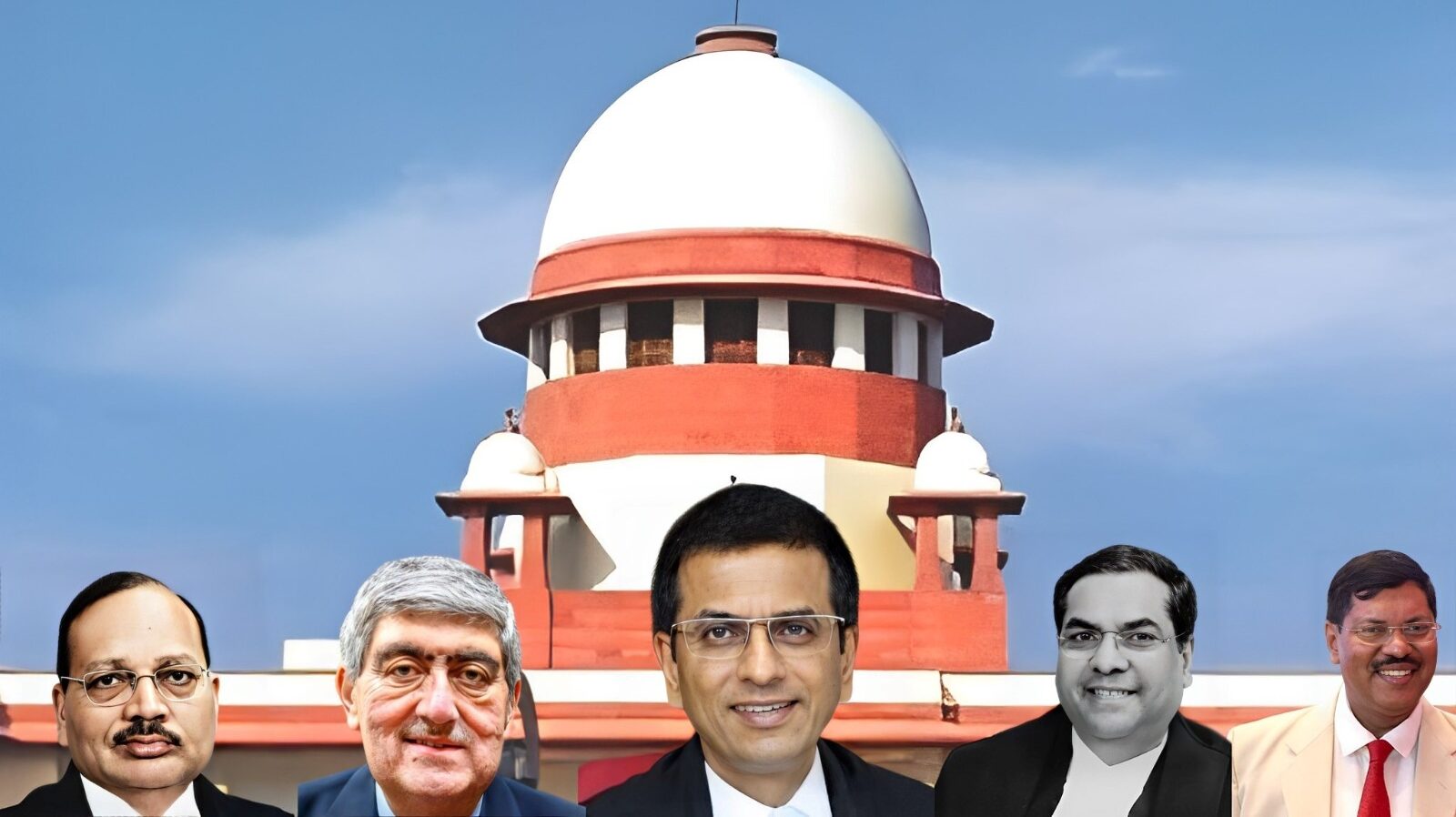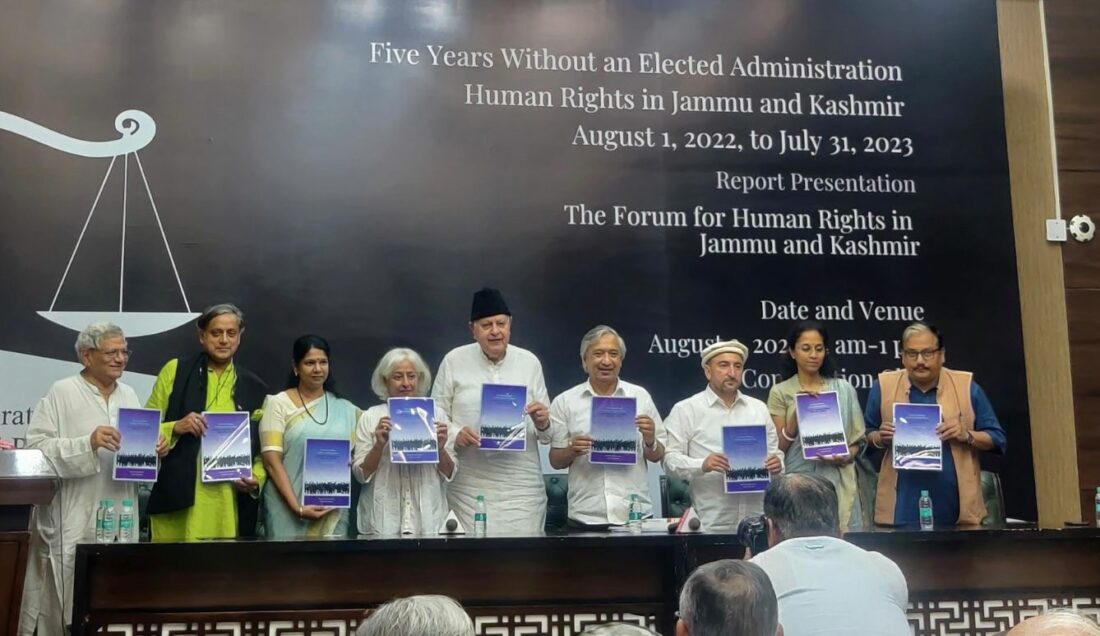Days ahead of the fourth anniversary of the undoing of Jammu and Kashmir’s special status, various opposition leaders participated in the formal release of a report by a non-governmental body in Delhi that evaluated the lows and depths of the five years of remote rule, reports Faiqa Masoodi
Last weekend marked the fourth anniversary of the undoing of Jammu and Kashmir’s special status and the state. Jammu and Kashmir has already completed five years of being without an elected government.
Jammu and Kashmir administration refused PDP, the last ruling political party, to have a seminar on the August 5, anniversary. On the eve of the anniversary, PDP said its middle-rung leaders were either driven to the police stations or their house guard was instructed not to allow the protected person out. On August 5, morning Mehbooba Mufti claimed she was put under house arrest. This coincided with the daily hearing of score-odd petitions challenging the August 5, decision-making, which are heard by a constitution bench three days a week.
Perhaps knowing the possibility of restrictions, some senior leaders from Kashmir’s political class had already flown to Delhi to attend a meeting where a report was released on the five years of remote rule. The Forum of Human Rights in Jammu and Kashmir reported “no improvement in gross violations of the freedom of expression and movement”, especially “the rights of media” coupled with, “arrests under the Unlawful Activities (Prevention) Act (UAPA) and the Public Safety Act (PSA).”
The Forum report Five Years Without an Elected Administration: Human Rights in Jammu and Kashmir, August 2022 – July 2023, jointly co-authored by a forum comprising former Union home secretary GK Pillai, Radha Kumar (erstwhile interlocutor), retired Supreme Court judges, Chief Justices of High Courts, and retired bureaucrats.
Its findings apart, the report flagged the demands for an assembly election in Jammu and Kashmir and a legislative assembly for Ladakh. “It has been nine years since the last legislative election in Jammu and Kashmir. The union administration accepted the delimitation commission’s report a year ago and it is eight months since fresh electoral rolls were prepared,” the report, which was released by the Forum members and a cross-section of non-BJP political leaders, reads. “All the preparations for an election have thus been completed, but the election commission has yet to announce dates for it.”
Interestingly, the twin demands found an echo in the speeches that the political class made on the occasion.
National Leaders
Comrade Sitaram Yechury (CPIM) said that if peace and normalcy are to be restored in Kashmir, holding elections is the only way out.
Yechury criticised the “erosion of equality” in Jammu and Kashmir and referenced issues in Manipur.“The restoration of democratic participation would go a long way in restoring normalcy in the state. If there is no militancy and peace prevails, then conduct elections and give the people of Kashmir a right to choose their representatives,” Yechury said, insisting the political class must mount pressure for early elections.

Throwing his weight behind the early election demand, Congress’s Shashi Tharoor expressed concern about the humanitarian aspects of search and cordon operations, urging for a more compassionate approach. He felt alarmed over the increasing number of security personnel deaths in Jammu and Kashmir. He suggested the government must work in cooperation with local groups to ensure the return of Kashmiri Pandits.
Kashmiri Leaders
MY Tarigami expressed complete dissatisfaction with the current rule in the region. Regretting the undoing of the promises enshrined in Article 370, the Communist leader said despite being Muslim-majority state Kashmiris chose secularism over faith. “But ever since India saw the dawn of independence the saga of our miseries has been continuing,” lamented Tarigami. “The relations have been strained and there is a sense of alienation due to the denial of constitutional rights to the people. Was the decision of our ancestors to choose democracy over religion wrong?”
Pleading Forum members to help restore Article 370, Tarigami said, “We have been knocking on every door, seeking justice, but every time our pleas are falling on deaf ears. I am ashamed of it now and don’t want to plead anymore.”
Dr Farooq Abdullah’s speech was keenly watched. He called the nation to stand together there and bridge the trust deficit that exists between the people of Jammu and Kashmir and the rulers in Delhi.
Jammu and Kashmir occupies a unique position as it is the only Muslim-majority state in India, he said. “Despite being a Muslim majority state, we choose India as we were persuaded by Mahatma Gandhi’s message of tolerance and unity. Whatever is currently happening in the country is therefore a matter of great concern as it goes completely against the ideologies of the founding fathers of this nation.”
Calling for dialogue with Pakistan, he highlighted the need to address infiltration and its impact on citizens, particularly the Muslim community. He criticised attempts to define people’s nationality based on regional affiliations, arguing that such decisions should not be imposed on individuals.
Confirming that Jammu and Kashmir is being used as fodder in North Indian politics MP Manoj Kumar Jha said, “There is a huge difference between the idea of normalcy in Delhi and that in Kashmir and this distance needs to be bridged. Moreover, the only concern right now should be holding elections.”
Rs 50K Crore Loss
The Forum reported that over three dozen economic, political, and social rights have been violated between August 2019 and July 2022, which have resulted in economic losses worth over Rs 50,000 crores at a conservative estimate, vitiation of land and domicile rights, marginalisation, and even purges of local personnel in the civil and police services and questionable arrests under draconian legislation.
The report suggests that all these happenings stand in total contrast to the counter-affidavit filed before the Supreme Court in July 2023 against petitions challenging the constitutionality of the Presidential Orders of August 5, 2019, and the reorganisation act 2019, by the MHA, claiming that the changes brought by the two actions had ‘brought unprecedented development, progress, security, and stability to the region.’

The other major issues highlighted by the report stated that in March 2023, unemployment was almost three times the national average of 7.8 per cent, standing at 23.1 per cent.
While admitting that the number of lives lost due to armed attacks and counter-insurgency operations was lower than in the previous year, the number of police personnel who died, including Central Reserve Police Forces (CRPF), continues to be high.“71 CRPF troops were killed in the four years between 2019-2022, twice as many as in the previous four years, 2014-2018 when 35 died. By comparison, in the four years between 2012-2015, which can be categorized as an uneasy interregnum between the post-peace process years and the rise of conflict in the BJP-PDP coalition, 27 CRPF troops were killed,” it said.
The report has also highlighted the resurgence of militancy in Jammu after decades of peace. “After decades of peace, the bordering areas of Poonch and Rajouri districts in Jammu division are re-emerging as a locus for militancy with cross-border support from Pakistani-held territories of the former state.”
True to form and in keeping with the clampdown on mainstream democratic activities organised by parties opposed to 5th Aug 2019, the JKNC office has been sealed by the police. No one is being allowed in or out of the office.
These steps betray the nervousness of the…
— JKNC (@JKNC_) August 5, 2023
It also pointed to custodial deaths and overcrowded prisons. The Jammu and Kashmir courts have flagged overcrowding and negligence as causes of custodial deaths. “The region’s prisons can house a total of 3629 inmates, but they lodged 5300 as of June 2023.”
Ladakh Issues
The Forum did not skip Ladakh in its report and demanded the government should accept and implement the tribal welfare ministry’s recommendation that Ladakh be included in the sixth schedule.
Ladakh politician Sajjad Hussain Kargili, while highlighting the ongoing protests in Ladakh following the abrogation of Article 370, said that people have been fed a false narrative that Ladakhis wanted a separate Union Territory.
“A section did rejoice after the abrogation of 370, however, the first protest after the abrogation also was also from Ladakh. Ladakh too had internet blackouts, shutdowns, and protests,” he said.
Insisting that Ladakhi has repeatedly proved its patriotism, Kargil called for the restoration of constitutional rights to stop alienation. “You have been saying that Kashmiris had usurped our rights but the fact is that they always gave us four berths in assembly. What have you given?”
I’ve been put under house arrest along with other senior PDP leaders today. This comes after a midnight crackdown where scores of my party men are illegally detained in police stations. GOIs false claims about normalcy to the SC stands exposed by theirs actions driven by… pic.twitter.com/gqp25Ku2CJ
— Mehbooba Mufti (@MehboobaMufti) August 5, 2023
Recommendations
The Forum report has recommended releasing all political detainees who were taken into preventive detention on or after August 4, 2019, and implementing the rights to bail and speedy trial. It suggested repealing the PSA and other preventive detention legislation or amending them to bring them in line with the constitutional ethos. It has suggested the current reservation bills be put “on hold until the supreme court rules on the constitutionality of the August 2019 Presidential orders, the reorganization act, and the measures taken under it.” It wants the government to discuss the statehood of Ladakh with stakeholders, roll back the new media policy, including police checks and/or raids on media outlets, bans on drones used by video journalists.
The forum also recommended the reinstating of all the former state’s statutory oversight bodies, especially those monitoring human rights, such as the Jammu and Kashmir Human Rights Commission and the Jammu and Kashmir Women and Child Rights Commissions.
“Ensure that local communities are involved in facilitating the return of Kashmiri Pandits. Without local support, returnees will not be safe, and their reintegration will prove extremely difficult. Initiate criminal and civil actions against personnel of police, armed forces and paramilitary forces found guilty of violation of human rights, especially with regard to attacks on journalists,” it recommended.
The Forum also called for the releasing the action-taken reports on the July 2020 extra-judicial killing of three Rajouri youth in Shopian, the December 2020 Hokersar deaths and the alleged custodial death of Irfan Ahmed Dar of Sopore, and the status of subsequent prosecutions.

